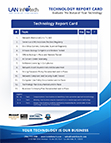These 7 Trends are Currently Changing Production: How Does Your Manufacturing Process Compare?

Technology and manufacturing are joining forces in new ways: Here’s what to watch for.
“How will technology affect production and manufacturing?” is a very old question – but one that’s always worth asking, because technology is constantly creating new changes for this corner of the industry. Here are the top seven ideas that really are making a difference, not in five years or ten years, but right now, as manufacturing divisions take a look at their current positions. Where do they rank on your list?
1. Analytics and Transportation Grow Closer
Obviously analytics is going to be on the list: Every manufacturing company can probably find something to do with new analytics. But what are they actually doing? It turns out that better data and analysis are particularly useful when it comes to cutting down transportation costs. There’s still a lot of money to save in shipping, so it’s no surprise that digital platforms are working to increase the analysis and automation of shipping decisions to help find the cheapest carriers, routes, and shipping methods on the case-by-case basis. This method is especially effective with collaboration if external partners use similar or compatible platforms.
2. Sensors and Scheduling Reduce Downtime
“Condition based maintenance” is a phrase that you’ll here a lot when it comes to manufacturing and the Internet of Things. The idea is simple, but revolutionary. Today’s equipment, especially long-term factory equipment and rented equipment for special projects, can be equipped with internal sensors that monitor various specs and processes. The benefits are twofold: First, machinery can be monitored for performance to help increase efficiency and ensure accurate production. Second, maintenance schedules can be exchanged for sensor-based data that can show exactly when a part needs repair, lubrication, or another form of care.
3. Automation is Gearing Up – But Uncertainties Reign
Everyone in manufacturing wonders how AI, automation, and the overloaded word “robots” will change their industry. There are two important facts about automation worth noting. First, automation and industrial robot purchases are indeed rapidly increasing, especially in previously human-dependent nations like China. Second, it’s still a little too early to fully understand how automation will change the manufacturing industry. Various companies have embraced fully or partially automated factories, but most manufactures are hanging back and waiting to see where automation investment is most worthwhile. In general, the more precision that is required, the more useful automation will be.
4. Cobots and New Positions
Cobots is a Microsoft term for collaborative robots, or automated machinery working side by side human workers in the factory. This is a more popular solution than full automation, but it also changes the responsibilities of manufacturing employees. Technical knowledge, IT skills, maintenance, and management become far more important, increasing the skill levels that HR departments should look for.
5. Blockchain Records
Blockchain is a complex subject, but essentially it allows people to work in concert to both encrypt and record specific types of data in a digital format that is incredibly secure. Blockchains are famous for not being able to be altered, which makes them ideal for recording manufacturing data in today’s digital world. Expect to see a lot more blockchain solutions on the horizons.
6. Aggressive Hiring Practices
It’s not just necessary employee skills that are changing, it’s also demand for labor and hiring practices. Manufacturing continues to struggle to find enough qualified employees, a combination of many factors that all point to a necessary upgrade in hiring technology and systems. Manufacturers need to embrace social media, online applications, and digital connections with trade schools and other organizations to help fill in this gap. Until they do, troubles will continue.
7. Tearing IT Down and Building It Back From the Ground Up
Let’s talk about ERP for a minute: ERP solutions have been so popular for so many years that every manufacturer has a least a few ERP systems floating around in their processes. That’s a problem: Most of these systems are disjointed, incompatible, focused only on singular goals, vulnerable to data attack, and poorly supported. The market has changed to much to allow ERP systems to remain: That’s why a growing number of manufactures are tearing down all their IT related to resource management and choosing new systems that can handle multiple aspects of the business. It may be tough to consider, but it’s an increasingly smart move.
If you want more information about how to best upgrade the technology your Fort Lauderdale company depends on, give LAN Infotech a call at (954) 717-1990 or send us a message at sales@laninfotech.com.

LAN Infotech is a Microsoft Cloud Services Provider, IT Managed Support company and a leader in helping law firms, nonprofits and medical organizations deploy cloud solutions, manage computer networks, keep data protected and top technology management company. Businesses like yours need technology support to run highly-effective organizations.


